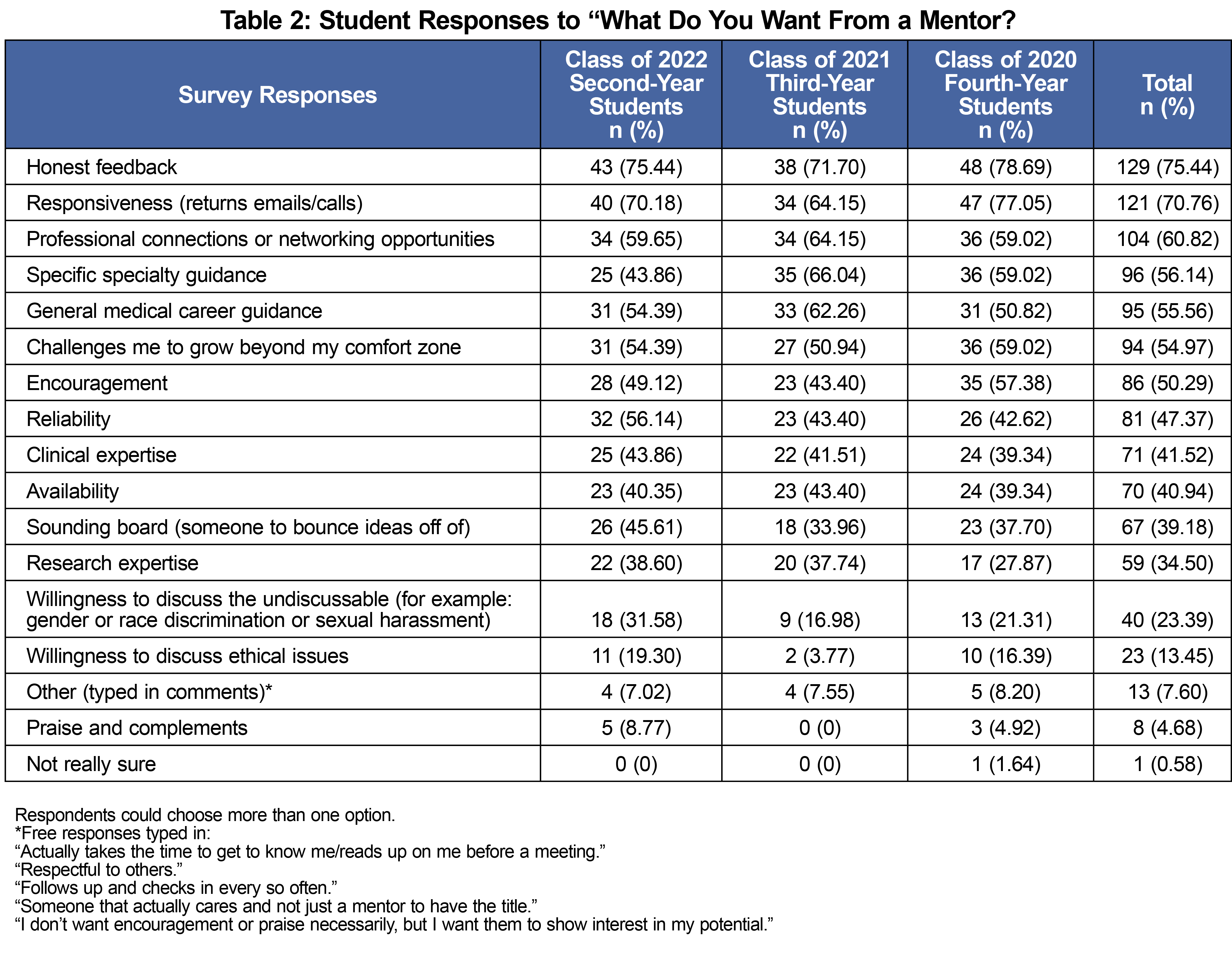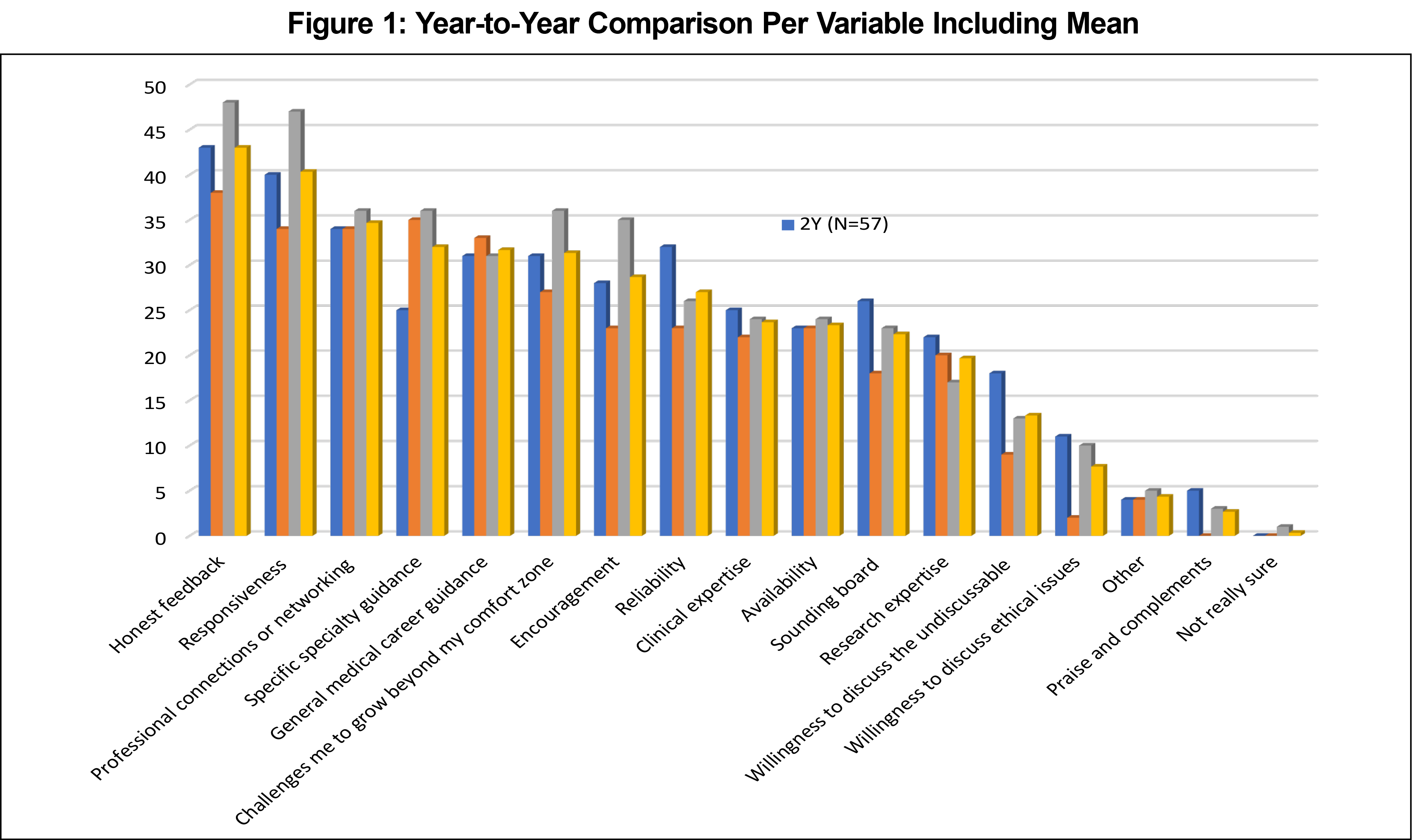Despite mentoring being vital in medical education, medical education literature lacks a uniform mentoring definition.1 Definitions include “a longitudinal relationship in which guidance and advice is given for the purpose of professional development,”2 “a naturally formed, one-to-one, mutual, committed, nonsexual relationship between a junior and senior person designed to promote personal and professional development beyond any particular curricular or institutional goals,”1 and “a personal connection with a faculty member invested in helping the student achieve a personal and professional vision.”3 Mentee benefits include increased confidence, satisfaction, publication, and grant funding; a safe haven to discuss ideas/plans; sponsorship; recognition; and a close relationship providing encouragement, information, guidance, and feedback.1,4,5 Mentor benefits include creating legacy; networking; new skills, inspiration, information and ideas; and increased productivity, career advancement, satisfaction, and retention.1,4,5
Mentoring roles include coach, advisor, teacher, counselor, and sponsor in the setting of mutual trust toward impacting psychosocial and career functions for the mentee.5–7 Unlike the services of a coach or counselor, mentoring does not require a fee.8 As a coach, the mentor develops a specific mentee skill, task, or goal.6 As an advisor, the mentor imparts specific professional development.6 As a counselor, the mentor encourages self-reflection.5 As a sponsor, the mentor advocates for the mentee via networks and opportunities.2,5
Mentoring may further career and psychosocial development of mentor and mentee.7,9 Psychosocial functions include competence, confidence, identity, and effectiveness.5,7,9 Trust is foundational; the relationship is rather intimate, with mentee and mentor learning about each other’s lives.4,10
Conflict may occur when a supervisor acts as a mentor.4,6,11 The supervisor’s need to evaluate the mentee’s work may conflict with the promoting the mentee.12 Nonetheless, one’s chair may effectively mentor.11
Effective mentors need knowledge about career planning, roles, expectations, and policies, and professional communication and relationship skills.5,13 Mentoring skills include maintaining confidentiality; challenging others beyond comfort zones, connecting others, serving as role models, communication, support, motivation, feedback, reflection, and research skills.5,13,14 Mentoring attitudes include respect, humility, willingness, compassion, inclusivity, commitment to invest time and energy, and optimism over cynicism.5,13
Mentoring and advising improve underrepresented minority medical student performance.15 Black, Hispanic, and female residents valued, but were challenged with finding, mentors with concordant gender and racial/ethnic identities.16 Matching mentoring relationships based on demographics may be preferred, but is not usually possible with decreased relative minority mentor numbers.2 Mentor sensitivity is more important than concordant gender, race or ethnic mentoring relationships.10 Mentors sensitive to mentee needs may effectively mentor across ethnic or gender discordance.4 Bettis et al found that while gender-concordant mentors were not vital for women surgeons, female surgeon role models were key.17
Our literature search revealed fewer studies regarding medical student mentor characteristics than for residents and faculty. Only 25 papers met our inclusion criteria for one student mentoring program review.18 Several articles detailed specific student mentoring aspects (eg, military-related medical students,19 fourth-year medical students,3 third- and fourth-year student mentoring program,20 and informal mentoring).1
Medical students value mentoring relationships.1 Students without family/friend physicians believed they needed mentoring more than students with family/ friend physicians, noting difficulty in understanding personal and professional roles.20 Fourth-year students emphasized mentoring relationship support, trust, and personal connection toward empowerment and career development.3 Third- and fourth-year students stated mentoring provided students a free zone, hope, and support in transitioning to physician.20 Student mentees noted a positive influence on career planning and research, viewing mentors as counselors, idea providers, and role models.15 Students’ varied goals and development necessitate personalized, flexible mentoring.1,21 Medical student mentors should be available, convey respect and confidence, focus on the mentee, ask questions, track progress, identify strengths, and give feedback, avoiding promoting agendas, using free labor, taking credit, and making clones.1







There are no comments for this article.